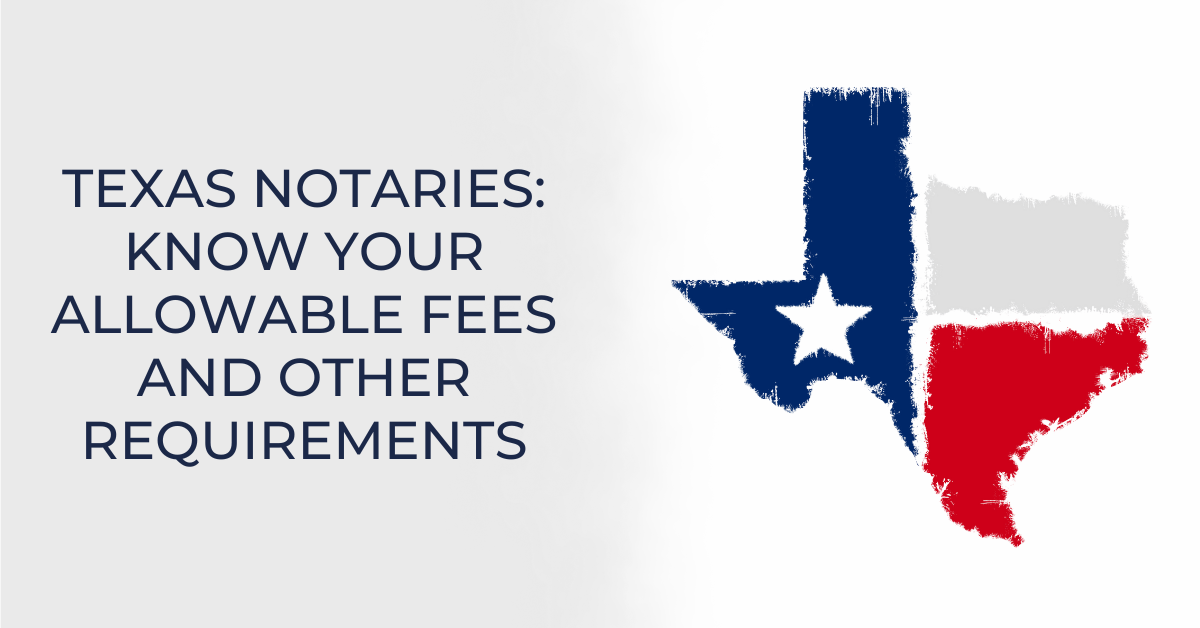Notary Public Underwriters Blog
Texas Notaries: Know Your Allowable Fees and Other Requirements
- Details
- Published: July 28, 2025

Notaries and/or their employers are not required to charge a fee for their services; however, many do. Here’s what you need to know if you or your employer charges fees for notarial services.
What Are the Allowable Fees?
Notaries may not charge more than the authorized amounts listed in Texas Government Code §406.024. Notaries or their employers may charge the following:
- For protesting a bill or note for nonacceptance or nonpayment, register and seal: $4
- For each notice of protest: $1
- For protesting in all other cases: $4
- For certificate and seal to a protest: $4
- For taking the acknowledgment or proof of a deed or other instrument in writing, for registration, including certificate and seal: $10 for the first signature, and $1 for each additional signature
- For administering an oath or affirmation: $10
- For a certificate under seal not otherwise provided for: $10
- For a copy of a record or paper in the notary public’s office: $1 per page
- For taking the deposition of a witness: $1 per 100 words
- For swearing a witness to a deposition, certificate, seal, and other business connected with taking the deposition: $10
- For a notarial act not otherwise provided for: $10
Important: Charging more than the allowable fees may result in the revocation of your notary commission.
Fee Schedule – Posting of Fees
If you or your employer charges a fee for notarial services, you are required to post a schedule of fees in a conspicuous place at your office or place of business. If you are a mobile notary, you must provide the fee schedule to your client for review prior to performing the notarial act.
Receipts and Records of Fees
Texas notaries are required to: Provide a written, itemized receipt for any fees charged Sign the receipt Maintain a fee book detailing all notarial fees charged You may use a separate fee book or include this information in your notary record book, provided it includes an entry for fees charged.
Additional Fees
Texas law does not address charging additional fees for notarial services. If you choose to charge miscellaneous fees—such as for travel, mileage, or other services—you must discuss these charges with your client beforehand. Note: The IRS standard mileage rate for 2025 is $0.70 per mile. Provide an itemized list of any additional fees on a separate receipt, so they are not confused with your notary fees.
Related Article(s)
Test Your Notary Knowledge: Take Our Notary Quiz!
Customer Expectations Versus Notarization Requirements
Fighting Fraud: Why Notaries Should Avoid Using Signature Stamps
Tips to Protect Your Notary Stamp and Journal
How to Get More Notary Business Part 1: Optimize Your Marketing
How to Avoid Common Mistakes During a Notarization
When Can a Notary Use Personal Knowledge to Identify a Signer?
Does a Notary Need to See the Entire Document When Notarizing?
Can a Notary Correct a Mistake on the Notarial Certificate?
Notary FAQs: Essential Answers for Everyday Scenarios
Top Ten Mistakes That Notaries Make
Can a Notary Notarize a Family Member's Signature?
